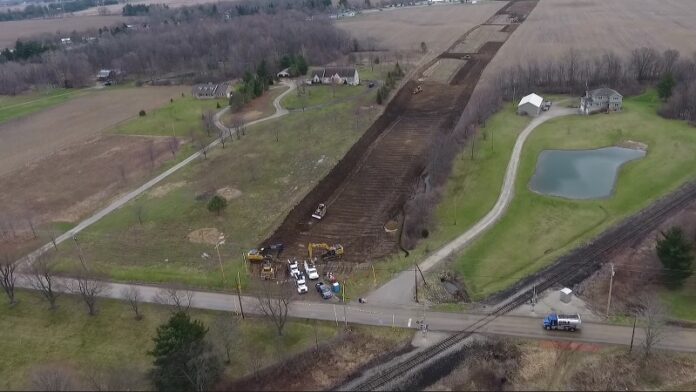 A group of over 50 landowners from the region whose farms and homes are in the path of the proposed Mountain Valley and Atlantic Coast fracked gas pipelines will hold a press conference on Wednesday outside the D.C. offices of the Federal Energy Regulatory Commission (FERC), to announce their filing of a lawsuit against FERC to end the abuse of eminent domain for private gain for pipelines.
A group of over 50 landowners from the region whose farms and homes are in the path of the proposed Mountain Valley and Atlantic Coast fracked gas pipelines will hold a press conference on Wednesday outside the D.C. offices of the Federal Energy Regulatory Commission (FERC), to announce their filing of a lawsuit against FERC to end the abuse of eminent domain for private gain for pipelines.
The lawsuit, filed this week in Washington D.C. in federal district court, challenges the constitutionality of the eminent domain provisions of the Natural Gas Act, and seek to end the unconstitutional and unconscionable process of taking citizens’ private property via eminent domain for a corporation’s profits — and not for “the public good” as is intended.
“We find it very difficult to understand how a multi-billion dollar private company can forcibly take our land through a perverted concept of eminent domain, especially when the project is not needed, and would bring such tremendous negative impacts to so many people,” said Bill Limpert, whose family farm is in the path of the proposed Atlantic Coast fracked gas pipeline. “The fact that the Federal Energy Regulatory Commission, fully funded by the energy industry, is the agency that would grant that power makes it even harder to take. Our government has ceded its authority to the rich and powerful. We The People deserve better.”
“The provision for eminent domain is not being met by FERC in the case of the proposed Mountain Valley fracked gas pipeline project — there is no proven need, and it is not for public consumption,” said Jerolyn Deplazes, a landowner on the proposed Mountain Valley pipeline route. “This is a private company asking the government for other people’s land for profit. This must not stand.”
The lawsuit targets FERC’s encouragement of pipeline companies to negotiate easement agreements with landowners in advance of the agency’s issuance of a “certificate of need,” which results in “irretrievable commitment of resources” to a particular route prior to a formal decision, and absolves the Commission of its responsibility to actually determine whether a proposed project is needed.
“FERC’s policy of encouraging pre-certificate easement negotiations between
impacted landowners and the pipeline impermissibly biases the outcome of the certificate approval process, because FERC views pipeline proposals more favorably when the company has acquired most of the easements by negotiation,” the lawsuit states. “In so doing, FERC emboldens private companies to abuse eminent domain rights by duping landowners into signing an easement agreement by threatening them with eminent domain powers that the company does not have, or by until by refusing to agree to any protective measures in advance of construction until the landowner agrees to sign an easement, often for constitutionally inadequate compensation.”
The lawsuit also specifically challenge FERC’s issuance of “conditioned certificates” — which authorize a taking of property rights that are not, and may never be, necessary to construct the proposed project; and “blanket certificates” — which inappropriately grant a private company eminent domain power coextensive with that of the state, and strip future aggrieved landowners of their rights to formal administrative procedures.
Under the current regulatory regime, landowners are left without a forum to challenge eminent domain abuses. Meanwhile, virtually anything goes — with certificates conferring eminent domain issued by FERC to pipelines that do not serve a public use, but instead, facilitate gas for export or create opportunities for pipelines to monopolize the market for input to gas and electricity to be distributed in markets controlled by the pipeline’s affiliates.
Plaintiffs in the lawsuit include Bold Alliance, and individual landowners on the proposed Mountain Valley and Atlantic Coast pipeline routes in West Virginia, Virginia and North Carolina. Defendants include FERC and its individual commissioners, and Atlantic Coast Pipeline, LLC and Mountain Valley Pipeline, LLC.


